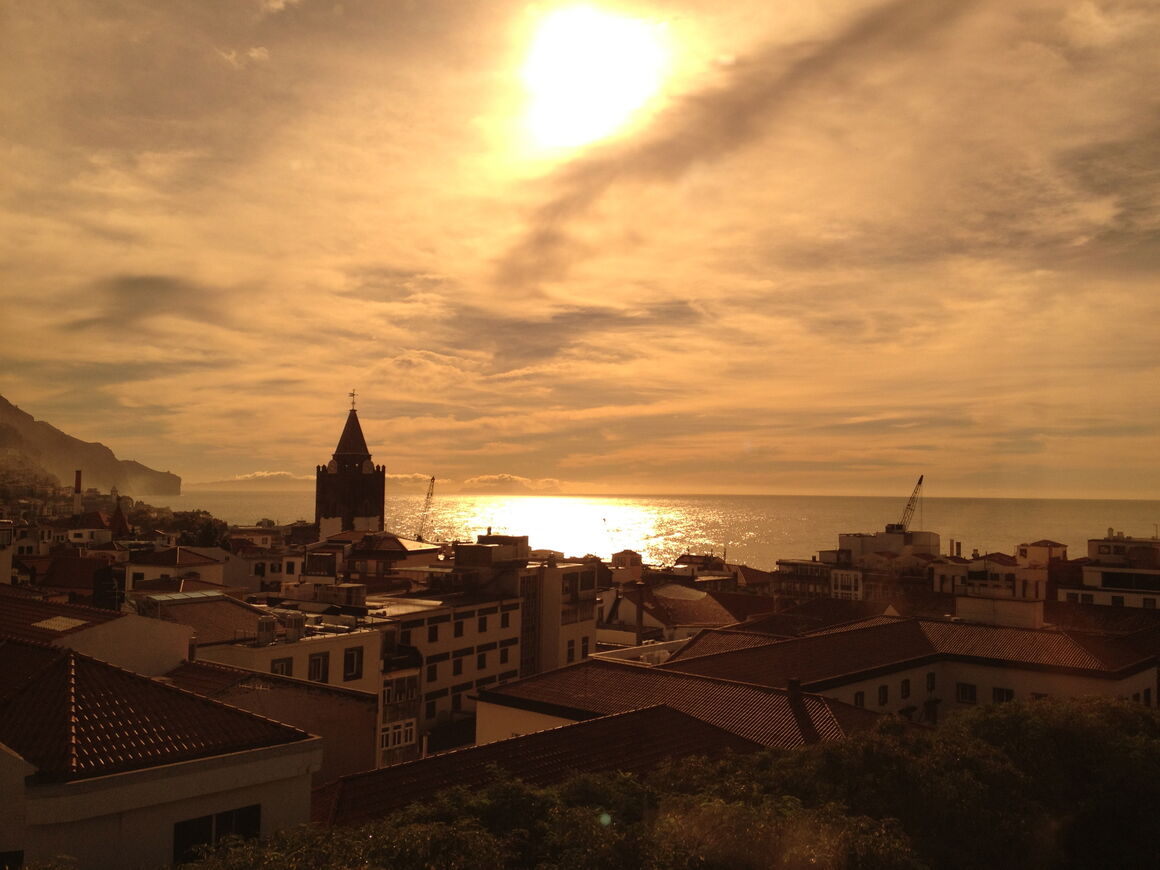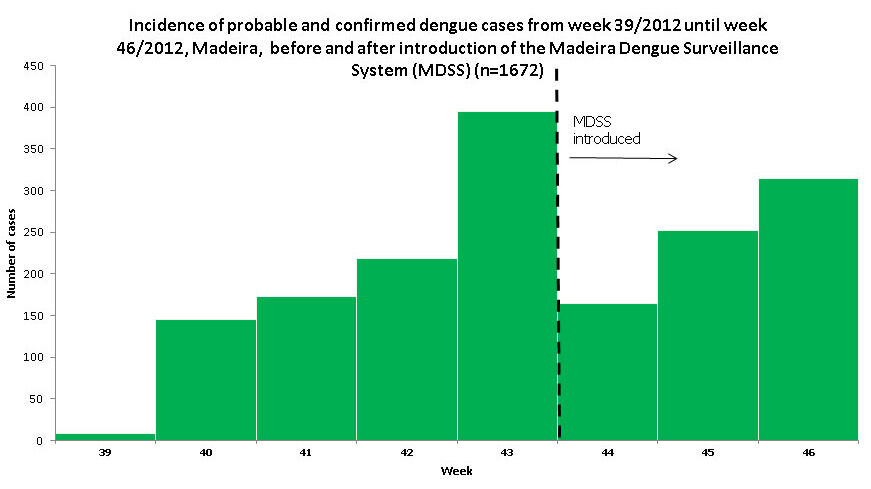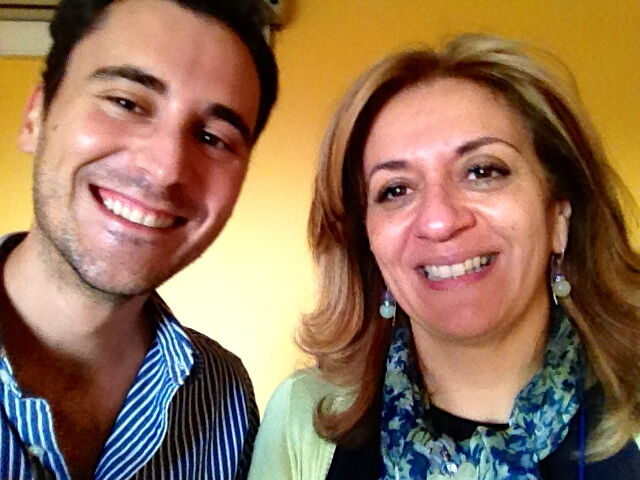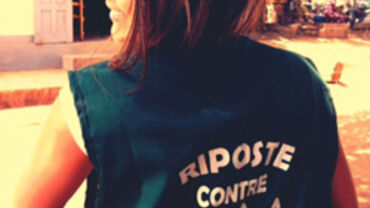A dengue outbreak in Madeira: From epidemiology to health education leaflets in six languages
Benedetto is an EPIET 2012 cohort fellow from Italy now based in Public Health England, London. He is sharing with us his experiences from his first outbreak investigation mission, on which he went directly from his first ESCAIDE conference in Edinburgh.

How did the opportunity arise for this mission?
Madeira faced an outbreak of dengue at the beginning of October 2012. This is the first large scale, sustained outbreak of dengue in Europe since the 1920s. Portugal requested ECDC’s assistance with an assessment of the situation and guidance for outbreak control. The ECDC response team rapidly identified that going to the field with an EPIET fellow would provide added value. As it is always the case when an outbreak arises, I was asked to get on the plane immediately. At the time, I was in Edinburgh for my first ESCAIDE conference, so I just packed my bag and went to Madeira instead of heading back to London. When I arrived, with a winter coat and a scarf on, it was +20 degrees and beautifully sunny.
This is the first large scale, sustained outbreak of dengue in Europe since the 1920s. Portugal requested ECDC’s assistance with an assessment of the situation and guidance for outbreak control.

What were the most challenging aspects whilst in the field?
The first challenge was that I had only just started my EPIET training when I left. I had limited experience in outbreak investigations and we were faced with a complex situation. Despite this challenging beginning, all the people I worked with, both from Madeira and from ECDC, did a splendid team work. I learned a lot in a short time.
The other challenge was to deal with many actors and stakeholders together. Supporting the measures for mosquito control could only be achieved through close collaboration between field epidemiologists, entomologists, laboratory staff, statisticians, public health experts, engineers, technicians and national authorities. Taking any action would have been impossible if we had not generated the data needed and turned them into pieces of information, just like a jigsaw puzzle.
I had limited experience in outbreak investigations and we were faced with a complex situation. Despite this challenging beginning, all the people I worked with, both from Madeira and from ECDC, did a splendid team work. I learned a lot in a short time.

Can you summarise your involvement in this field mission?
First, I supported the ECDC team in developing a new electronic surveillance system for dengue. This involved liaising with different stakeholders, developing a workflow for the transmission of data and implementing a series of post hoc adjustments to the system. Second, I was involved in the epidemiological analyses. That included updating databases weekly and producing time, place and person analysis. We produced epidemic curves and rates of disease by sex, age and geographical areas. Third, I contributed to drafting the ECDC mission report (1), and supported the local team of biostatisticians drafting the weekly bulletins. Those were useful to the ECDC risk assessment (2). Finally, I went on several field visits around the capital, Funchal, and participated in a community health intervention in a school.

Do you have any particular achievement or anecdote?
One of the initiatives of the health authorities in Madeira was to publish a multilingual flyer to inform tourists about the outbreak and to promote prevention measures. To speed up the process, I asked my EPIET colleagues and friends for help. In 48 hours we got back translations in Spanish, French, German, Italian, Russian and even in simplified Chinese!
What have you learned from this mission / outbreak investigation?
Team work and good coordination are always mentioned in the first chapter of every epidemiology book, but a first-hand experience gave me a real vision of how important and challenging this is in real life. Another lesson has been to manage tight working schedules under stressful conditions. That requires a clear mind and logical thinking at all times.
I also learned much on dengue and other vector-borne diseases. My prior knowledge was limited to what I had learnt in medical school. This might seem relatively unimportant, but vector-borne diseases like chikungunya, dengue, West Nile fever and malaria have already made a comeback in Southern Europe. Chances are, with climate change and globalisation, they might become more common in the future. As an Italian, who knows the experience in Madeira might come handy in years to come?
Team work and good coordination are always mentioned in the first chapter of every epidemiology book, but a first-hand experience gave me a real vision of how important and challenging this is in real life. Another lesson has been to manage tight working schedules under stressful conditions. That requires a clear mind and logical thinking at all times.
What would you advise other EPIET fellows for the future, based on your experience in this mission?
At the beginning I was unsure whether to apply for this mission since I was new and relatively inexperienced. On hindsight, I am very happy I did, and would advise my EPIET fellows to take every chance they are offered. Aside from the great working experience, I had the chance to see an incredibly beautiful island, work outside while wearing a shirt in November, practice my Portuguese, make new friends and eat swordfish with fried bananas!





